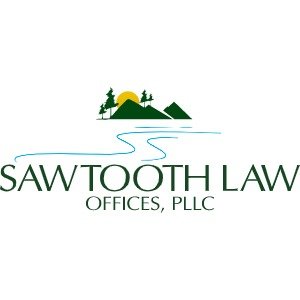Best Antitrust Litigation Lawyers in Idaho
Share your needs with us, get contacted by law firms.
Free. Takes 2 min.
Or refine your search by selecting a city:
List of the best lawyers in Idaho, United States
About Antitrust Litigation Law in Idaho, United States
Antitrust litigation in Idaho refers to the legal process of resolving disputes related to laws that promote fair competition and prevent anti-competitive behavior among businesses. These laws aim to prohibit practices such as price fixing, bid rigging, market allocation, and monopolies. Both federal and Idaho state laws work together to ensure a competitive marketplace for consumers and businesses. Commonly, antitrust litigation can involve actions brought by private parties, the Idaho Attorney General, or federal agencies when there is suspected violation of these laws.
Why You May Need a Lawyer
There are many situations where an individual or business in Idaho may benefit from legal advice or representation in antitrust matters. Common scenarios include:
- Discovering that a competitor is engaging in price fixing or collusion
- Facing allegations of illegal business practices aimed at reducing competition
- Suspecting monopolistic behaviors in your industry limiting your market opportunities
- Being subject to investigation by state or federal antitrust authorities
- Seeking to recover damages in cases where your business has suffered harm due to anti-competitive conduct
- Needing to navigate regulatory compliance while contemplating mergers or acquisitions
- Responding to subpoenas or requests for information in ongoing antitrust investigations
Experienced antitrust lawyers can assess your situation, ensure you understand your rights, help you collect evidence, and represent you in court or settlement negotiations.
Local Laws Overview
Antitrust litigation in Idaho is governed by several statutes that operate alongside federal antitrust laws such as the Sherman Act, Clayton Act, and Federal Trade Commission Act. The most prominent Idaho law is the Idaho Competition Act, which was enacted to prevent restraint of trade, monopolization, and other unfair business tactics at the state level. Key points to consider include:
- The Idaho Competition Act broadly prohibits contracts, combinations, or conspiracies that unreasonably restrain trade.
- The law specifically bans monopolization and attempts to monopolize any part of trade or commerce in Idaho.
- Civil lawsuits can be initiated by the Idaho Attorney General, private individuals, or businesses harmed by anti-competitive practices.
- Successful plaintiffs may recover treble damages, which means actual damages multiplied by three, plus attorney fees and costs.
- Both direct and indirect purchasers may have standing to bring antitrust claims under Idaho law.
- Idaho courts interpret state antitrust laws in harmony with federal precedents, but some differences in enforcement and interpretation may exist.
Frequently Asked Questions
What is antitrust litigation?
Antitrust litigation involves legal disputes over business practices that are alleged to harm competition, such as price fixing, monopolization, and other anti-competitive conduct. The goal is to protect consumers and ensure a fair playing field for businesses.
Who enforces antitrust laws in Idaho?
Antitrust laws in Idaho are enforced by the Idaho Attorney General’s Office, private parties, and sometimes by federal agencies such as the Department of Justice and the Federal Trade Commission, depending on the nature of the violation.
What types of business practices are prohibited under Idaho antitrust law?
Commonly prohibited practices include price fixing, bid rigging, agreements to divide markets or customers, monopolization, and other activities that restrain trade or limit competition.
Can individuals sue for antitrust violations in Idaho?
Yes, individuals and businesses that have suffered harm due to anti-competitive practices may bring civil suits in Idaho state or federal court. They may be entitled to recover treble damages, attorney fees, and costs if they prevail.
How are damages calculated in antitrust cases?
Plaintiffs may recover actual damages they suffered as a result of the defendant's conduct. In Idaho, as under federal law, courts can award treble damages, which means three times the actual damages.
Are there time limits for filing antitrust claims in Idaho?
Yes, statutes of limitations apply. Generally, antitrust claims in Idaho must be filed within four years from when the violation is discovered, but exceptions and specific circumstances may change the applicable timeframe.
What is the difference between state and federal antitrust laws?
Federal laws apply nationwide and address a broader range of conduct, while Idaho state laws specifically address competition within the state. In many cases, both sets of laws can be invoked.
Can a small business be sued for antitrust violations?
Yes, any business regardless of size can face antitrust litigation if alleged to have engaged in anti-competitive practices. However, cases involving significant market impact or widespread harm are more common.
What defenses can be raised in antitrust litigation?
Defenses may include proving that the business conduct was justified, did not have an anti-competitive effect, or was not connected to trade or commerce in Idaho. Legal counsel can help identify the most effective defense strategy.
Can criminal charges be brought for antitrust violations in Idaho?
Serious antitrust violations, such as bid rigging or price fixing, can lead to criminal charges in federal court. The Idaho Competition Act does not itself provide criminal penalties, but federal authorities may pursue criminal prosecution for certain conduct.
Additional Resources
Those seeking information or assistance with antitrust issues in Idaho may find these resources useful:
- Idaho Office of the Attorney General - Consumer Protection Division: Handles antitrust enforcement and provides information on state laws.
- Federal Trade Commission (FTC): Offers guides and resources on federal antitrust laws and compliance.
- Department of Justice Antitrust Division: Conducts investigations and prosecutes federal antitrust cases.
- Idaho State Bar: Provides lawyer referral services and resources on finding qualified legal counsel in antitrust litigation.
- Local law libraries or university legal clinics: Can offer research materials or limited legal guidance.
Next Steps
If you believe you are involved in or affected by an antitrust issue in Idaho, consider taking the following steps:
- Document any practices or actions you suspect violate antitrust laws, including correspondence, contracts, and financial records.
- Consult with an attorney who specializes in antitrust law to review your situation and determine your legal options.
- Contact the Idaho Attorney General’s Office if you wish to report a violation or seek their assistance.
- Act promptly, as statutes of limitations can bar claims if they are not filed in time.
- Stay informed about both state and federal laws that may apply to your business or your case.
Legal issues involving antitrust claims can be complex and challenging. With the right guidance and representation, you can better protect your interests and ensure compliance with Idaho and federal laws.
Lawzana helps you find the best lawyers and law firms in Idaho through a curated and pre-screened list of qualified legal professionals. Our platform offers rankings and detailed profiles of attorneys and law firms, allowing you to compare based on practice areas, including Antitrust Litigation, experience, and client feedback.
Each profile includes a description of the firm's areas of practice, client reviews, team members and partners, year of establishment, spoken languages, office locations, contact information, social media presence, and any published articles or resources. Most firms on our platform speak English and are experienced in both local and international legal matters.
Get a quote from top-rated law firms in Idaho, United States — quickly, securely, and without unnecessary hassle.
Disclaimer:
The information provided on this page is for general informational purposes only and does not constitute legal advice. While we strive to ensure the accuracy and relevance of the content, legal information may change over time, and interpretations of the law can vary. You should always consult with a qualified legal professional for advice specific to your situation.
We disclaim all liability for actions taken or not taken based on the content of this page. If you believe any information is incorrect or outdated, please contact us, and we will review and update it where appropriate.
Browse antitrust litigation law firms by city in Idaho
Refine your search by selecting a city.















